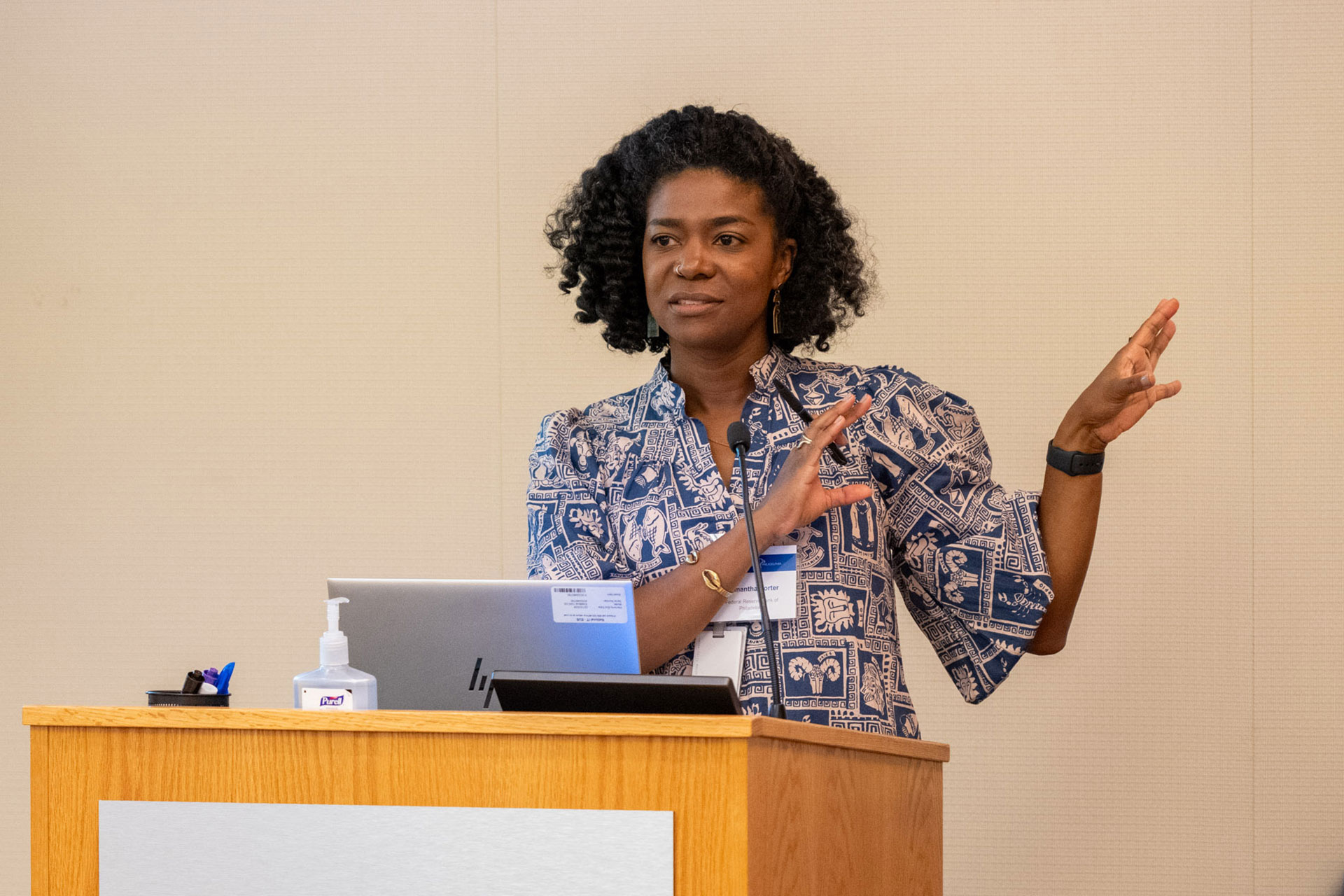Samantha Porter, Philadelphia Fed – Inspire Stories


Samantha Porter, Senior Manager and Advisor, Community Engagement, Philadelphia Fed
Samantha (Sam) Porter’s interest in community development (CD) began in graduate school, while pursuing a master’s degree in public administration. But a natural disaster jumpstarted her career in the field. “Even before I began working on disaster recovery, I had an interest in CD,” she said. “It was clear that public service and community development were important to me.”
In 2012, Superstorm Sandy (Sandy) devastated the Caribbean and coastal Mid-Atlantic United States leaving property damage, flooding, and billions of dollars in damage. As a member of the state of New Jersey’s policy and program development team focused on recovery after Sandy, Sam says she gained a comprehensive view of CD. “It exposed me to more aspects of community development because disaster impacts communities on every level,” she said. “I focused on housing recovery that used federal community development block grant funding. However, more than housing needed to be addressed.”
Sam noted that communities also needed investments in small businesses who experienced service disruptions during the storm. Workers were displaced, which impacted the labor market. And infrastructure for transportation, supply chains, and utility services all needed to be restored. Most importantly, she said, federal funding needed to be used primarily in low- to moderate-income (LMI) communities. This is because disaster recovery funding uses Community Development Block Grant appropriations within the US Department of Housing and Urban Development (HUD), which requires that a specific percentage of the funding be used in the recovery specifically for LMI communities.
Sam added that this work gave her an opportunity to focus on how this funding must be layered in historically underserved communities (by race and ethnicity) as well as in LMI communities. “HUD funding is just one of many sources of funding used to address disasters,” she said. “So working in this space also provided me with additional exposure to the ways in which funding can flow into these communities.”
After working in disaster recovery and at the city of Philadelphia’s mayor’s office, Sam realized she longed to utilize applied research to find solutions to specific CD challenges. The search to get back to her applied research roots in graduate school led her to the Philadelphia Fed. “When an opportunity to work at the Fed opened, I jumped at the chance to be a part of developing research,” Sam said. “I enjoy thinking about what questions people are attempting to answer, and how our research informs that. Working in government and public service around community development and economic issues inspired and felt right for me.”
Sam said the Fed’s commitment to high-quality work continues to impress and drive her to maintain that standard in her career. As a community engagement advisor and outreach manager, she promotes capacity building. Capacity building helps organizations improve their development, governance, and training to better serve their communities. In this role, Sam also shares industry expertise and best practices that can help in community development.
She also leads a team that compiles district insights through conversations with partners in LMI communities. These insights inform discussions on supervision, regulation, and monetary policy at her Bank. “I love engagement because it thinks about capacity building and how we bring Fed research in the CD space to practitioners so they can develop approaches to solve difficult issues,” said Sam. “Outreach is exciting because you get to know stakeholders and how they share the experience of the economy from the perspectives of LMI consumers.”
“When an opportunity to work at the Fed opened, I jumped at the chance to be a part of developing research. I enjoy thinking about what questions people are attempting to answer, and how our research informs that.”
In addition to outreach and research, Sam leads the Philadelphia Fed’s Equitable Wealth Initiative (EWI). EWI, a partnership between the Philadelphia Fed and the United Way of Greater Philadelphia and South New Jersey, focuses on the Black-white racial wealth gap in Philadelphia. Sam cites this initiative as one of the most exciting projects she’s worked on at the Fed.
The idea for this work grew out of the Fed’s 2021 webinar series, Racism and the Economy. During the virtual events, subject matter experts held conversations around various economic barriers that people of color face. “One webinar focused on the racial wealth gap and inspired my project for the EWI,” she said. “EWI brings together community leaders and partners to explore ways wealth and wealth-building opportunities provide the foundation of building a healthy, robust regional economy.”
Sam also co-authored the research report, “The Precarious Road to Asset Building.” The publication investigated the racial wealth gap in Philadelphia, and the experience residents have with asset building. Roundtables were held after the report’s release. “These discussions were very impactful because we strengthened the ecosystem of organizations in Philadelphia that are focused on wealth building and addressing the racial wealth gap,” she said. “And we also introduced a lot of important research on the topic to Philadelphia stakeholders.”
Sam says the challenges she saw in disaster recovery for LMI communities and the work that she does each day have similarities. She considers data and engagement as critical to seeing community development issues more broadly.
“It’s hard to see the experience of LMI individuals in general data,” she said. “However, there are indicators of how our economy is working, and how it can work for everyone when focusing on different aspects of LMI communities like race or gender. CD work is critical if we want to address the structures that affect these issues.”

Student loans often follow borrowers for years, sometimes decades. Even people who fully understand how much they borrowed can feel...

It was a busy week for RIA aggregators. There were a few large moves, including $235 billion multi-family office Cresset...

Blog Posts Archives UnfavoriteFavorite February 27, 2026 Weave: The Social Fabric Project Subscribe to Weave’s Newsletter This story was originally...